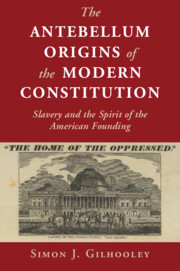Book contents
- The Antebellum Origins of the Modern Constitution
- Cambridge Studies on the American Constitution
- The Antebellum Origins of the Modern Constitution
- Copyright page
- Dedication
- Epigraph
- Contents
- Acknowledgments
- Introduction
- 1 The Constitutional Imaginaries of the Missouri Crisis
- 2 The Declaration of Independence and Black Citizenship in the 1820s
- 3 Abolitionism and the Constitution in the 1830s
- 4 The Slaveholding South and the Constitutionalization of Slavery
- 5 Theories of the Federal Compact in the 1830s
- 6 Slavery, the District of Columbia, and the Constitution
- 7 The Congressional Crisis of 1836
- 8 The Compact and the Election of 1836
- 9 The Afterlife of the Compact of 1836
- Conclusion
- Bibliography
- Index
7 - The Congressional Crisis of 1836
Published online by Cambridge University Press: 16 October 2020
- The Antebellum Origins of the Modern Constitution
- Cambridge Studies on the American Constitution
- The Antebellum Origins of the Modern Constitution
- Copyright page
- Dedication
- Epigraph
- Contents
- Acknowledgments
- Introduction
- 1 The Constitutional Imaginaries of the Missouri Crisis
- 2 The Declaration of Independence and Black Citizenship in the 1820s
- 3 Abolitionism and the Constitution in the 1830s
- 4 The Slaveholding South and the Constitutionalization of Slavery
- 5 Theories of the Federal Compact in the 1830s
- 6 Slavery, the District of Columbia, and the Constitution
- 7 The Congressional Crisis of 1836
- 8 The Compact and the Election of 1836
- 9 The Afterlife of the Compact of 1836
- Conclusion
- Bibliography
- Index
Summary
The first session of the Twenty-fourth Congress saw the tensions over slavery in the District of Columbia erupt on the floors of the House of Representatives and the Senate. In both chambers the presentation of abolitionist petitions became a point of controversy As actors in the Senate and House groped for a path around the polarizing and consuming issue of abolition, they moved away from reliance upon the text of the constitutional document and toward a constitutional spirit – embodied in the idea of “the compact” – as a way to navigate the apparent incompatibility of Southern and Northern understandings of the Constitution’s guarantee of rights of property. This chapter traces the process of the debates within each chamber of Congress before turning to a closer analysis of the constitutional issues raised by them. The chapter outlines the manner in which the invocation of “the compact” in the debates and in Pinckney’s Report of May 1836 met the challenges of the abolitionist petitions and erected an understanding of constitutional faith that rested upon the reanimation of values deemed present in the debates of 1787–88.
Keywords
- Type
- Chapter
- Information
- The Antebellum Origins of the Modern ConstitutionSlavery and the Spirit of the American Founding, pp. 158 - 186Publisher: Cambridge University PressPrint publication year: 2020

